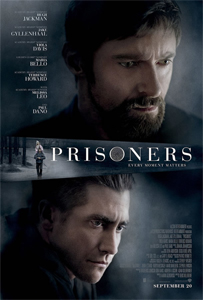An intense thriller, that is strangely both too long yet skimpy on portions of the narrative, this movie portrays a number of dark themes. Despite near unanimous critical praise, there are gaping plot holes, PC cliches galore, and precious little character development.
As the pic opens, Pennsylvania contractor and survivalist Keller Dover (Hugh Jackman) and his teenage son Ralph (Dylan Minnette) are hunting a deer. The meat will be used for their Thanksgiving dinner, to be held at the home of their friends and neighbors the Birches: Franklin (Terrence Howard), Nancy (Viola Davis) and daughters Eliza (Zoe Border) and Joy (Kyla Drew Simmons), the youngest. Keller’s wife Grace (Maria Bello, wasted in this role) rounds out the group.
After dinner, the four kids—including Keller’s young daughter Anna (Erin Gerasimovich)—go outside near their homes, and Joy and Anna climb around on a parked RV. The older kids pull them off, and they return to the Birch home. A few minutes later, Joy and Anna go by themselves to Anna’s house to search for Anna’s missing emergency whistle.
In short order, it is clear that the girls have been abducted, but Ralph remembers the parked RV, only it is no longer there. This is reported to the responding police detective Loki (Jake Gyllenhaal), and the authorities soon find the RV and its driver Alex Jones (Paul Dano). Upon interrogation, Alex is of no help, having the “mind of a ten-year-old,” and supposedly not understanding the questions he is being asked. Keller asks how such an individual could obtain a driver’s license, but this rather logical query is ignored.
Keller becomes even more furious when Alex is released 48 hours later due to lack of evidence, and appears just as the former suspect is being led out of the police station. Keller manhandles Alex a bit, and hears him say “They didn’t cry until I left them.” However, this is not heard by anyone else, and Alex’s aunt and guardian Holly Jones (Melissa Leo) says that her nephew uttered no such thing.
Loki is not pleased that Alex had to be released, and continues to pursue all known sex offenders. Meanwhile, Keller kidnaps Alex, and keeps him imprisoned in an old apartment building, hoping to force the truth out of him. Keller is convinced that Alex knows much more than he is saying. One thing is certain: The investigation is going nowhere fast.
The final reveal, upon reflection, is not a big surprise, but give credit where it’s due. Getting there is a compelling ride.
***SPOILERS AND OTHER COMMENTS***
For all the anti-torture posturing of the movie, and its associated spinning by the critics, no one seems to have noticed that absent Keller torturing Alex, the crime would not have been solved, albeit indirectly. Besides, Alex is hardly an innocent lamb, and seems to enjoy tormenting his dog.
Loki is clearly a troubled soul, replete with tics and tatts, yet we are given no back story despite the film’s 153 minute running time. No doubt, much of this is on the proverbial cutting room floor.
The perps are revealed to be serial abductors and killers of children, but just how they were able to get away with their life of crime for so many years—operating within a small geographic area—should reflect on miserable police work. However, if that is a theme of Prisoners, it is well-hidden. Moreover, Alex and another suspect are past victims of the same perps, and their keeping quiet is a bit much to swallow.
A subtle anti-Catholic bias pervades the proceedings, including Loki’s interrogation of a pedophile priest. Too bad that what the priest tells him is ridiculed, as it is the key to the entire case.
It is no secret that the girls are spirited away in the RV, yet forensics maintains that there is no fiber evidence—and there would not be, without a struggle. This is preposterous. I challenge the screenwriter to get in and out of a vehicle (with no struggle) yet leave behind no trace evidence. More than that, how many little girls would willingly get into the RV of a stranger?
The motive behind the abductions is said to be to “spite God,” since the perp’s own child died of cancer. Now there’s a motive for crime only a screenwriter could love. Grieving parents become vicious serial killers. Happens every day, right?
The name “Alex Jones” is taken from the famed conspiracy theorist and Internet celebrity. But why?
Keller Dover is portrayed as a survivalist, by keeping what appears to be at least a year’s worth of food and supplies in his basement. I guess we’re supposed to think of him as a clueless jerk since he can’t even protect his own daughter in front of her own house. Fair enough, but how can Loki be portrayed as a hero and super-cop, given the soporific pace of his investigation? Maybe he thinks the girls are already dead.
As Loki rescues Anna, he has been shot by the perp (whom he kills) and then decides that he himself must drive her to the hospital, in an impaired state, rather than call for an ambulance. Really?
A disturbing theme is the powerlessness of everyone—especially the women. One strong female does emerge, but she’s not exactly a heroine.
DP Roger Deakins gives the film an unrelentingly bleak look—very much in keeping with the overall downer tone.
As to “mind of a ten-year-old,” come on. A three-year-old kid could have responded better. The late Roger Ebert used to speak of “idiot plot” elements, whereby the entire conflict of the script could be resolved, only it isn’t. In this case, proper interrogation of Alex would have solved the case instantly.
My friends and I speak of those “Wait a minute…” moments that occur on your drive home from seeing a movie, whereby you suddenly recognize major problems. Sadly, Prisoners is loaded with them.
